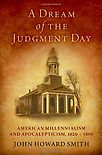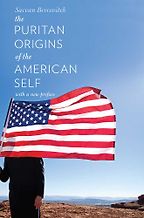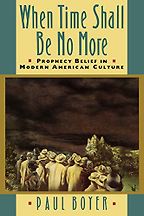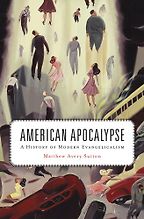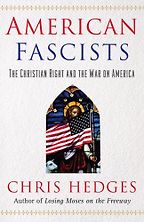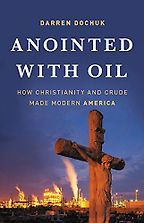Before we get to the books, can you give us an overview of the role religion plays in US politics?
Religion has played an enormous role in American politics, starting with the Puritan colonists of early seventeenth-century New England, and only with slightly less influence over the ensuing centuries to the present day. Although the American Revolution enshrined the idea of religious freedom, and the First Amendment to the Constitution prohibits Congress from establishing a national religion or passing laws infringing upon the free exercise of one’s religion, the blessing of the God of Abraham is routinely invoked before each session of the House and Senate, and the president ends many speeches with ‘God bless the United States.’ Candidates for elected office are practically required to profess their adherence to a religion—preferably Christianity—in order to establish their electability and trustworthiness, and those who are atheists or otherwise claim no adherence to a religion are often seen as immoral and dangerous to the ‘American way’ of life. Despite the seeming existence of a separation between church and state, what Thomas Jefferson called a ‘wall of separation’ is often little more than a speed bump.
Tell me a bit about your own area of interest, apocalypticism and millennialism and how that ties into religion in the US.
One thing to understand is that apocalypticism and millennialism are different things, but two sides of the same coin. Apocalypticism is the belief in a catastrophic end of the world. There’s this idea that this process will result in a better version of this world. Specifically in a Christian context, it refers to a 1,000-year period that’s going to precede the end of this material world and the creation of the new heaven and new earth. That 1,000-year period is going to see the world as perfect as it can be, before it comes to an end, and the final battle takes place.
Too often, that kind of belief in Christianity is treated as marginal. When people think about the end of the world, or predict it or talk about it, they tend to be equated with the wild-eyed bearded guy with the sandwich board on the street corner yelling and shouting. Or people might know about specific apocalypticists, like Jim Jones at Jonestown or David Koresh at Waco. Those figures are treated as fanatics. They’re looked upon as marginal figures who don’t represent what Christians are about, or what Americans are about.
But these are pretty core ideas to American identity, and they’re not marginal to Christianity in general. They’re pretty central. You can be very a-millennial in your approach and decide that the Book of Revelation is allegorical or metaphorical. But a-millennialism isn’t much of a thing here in America.
Up until the early 19th century, you have this post-millenarian idea, which is that everything is engineered for human improvement, everything is moving forward and moving up, this progressive idea that the millennium, whenever it happens, is going to be something that human beings have done themselves. It goes hand-in-hand with a belief in the global triumph of Christianity and the eradication of all other religions. The post-millenarian would say that this is part of a gradual process, everyone’s just going to realize that this is the one way and everything will be lovely at some point in the future.
“Despite the seeming existence of a separation between church and state, what Thomas Jefferson called a ‘wall of separation’ is often little more than a speed bump”
That was the prevalent belief through the 17th and 18th centuries, and up until about the time of the Civil War. Then, really going back to the Millerites in the 1840s, you start to have the pessimistic view of human relations and human progress; this idea that progress is an illusion, that it’s a Satanic delusion; that the Scientific Revolution was all about trying to wean people away from God and towards Satan. And so everything that looks like an advance and progress is really spiritual degeneration; and that things are going to get progressively worse and worse and worse. Therefore, Jesus will have to come personally, to put things to right. So, the 1,000 years is not going to be a period presided over by humans; it’s going to be one that Jesus himself presides over.
These ideas are much more prevalent in American culture than we’d like to admit. It helps to explain why, among other things, Americans have a particular love of disaster movies, and seem to really go crazy for things like The Road Warrior, The Walking Dead and The Road, and why there’s so much literature that proposes this ‘post-apocalyptic’, dystopic, world. I start the book mentioning Donald Trump talking about American carnage, suggesting that Barack Obama’s administration was the apocalyptic event and ruined America, and that he, Donald Trump, is going to come and save it and fix everything through the magic of his mere presence.
A lot of people outside the United States look at that sort of thing and think it is really weird, but you see it a lot in America. You don’t see it so much coming out of the UK, or Spain, or France or Germany. It’s not that they don’t have those elements, but they’re much more subdued and less part of a mainstream social, political or cultural landscape.
Most of the existing scholarship on apocalypticism focuses mainly on the beginnings of it in Jewish and Christian literature, or the expressions of it in the medieval and Reformation era. Less attention has been paid to how that has continued through the Anglo-American world. To the extent that scholars have looked at that, especially within the United States, they often start with the Millerites and move quickly into the 20th century because they want to talk about these strange cults—the Heaven’s Gate group, Waco.
The generally optimistic and hopeful post millenarian worldview that dominated America during the Revolution eventually waned and disappeared after the Civil Wa, and begins to be almost completely replaced by a pre-millenarian worldview, grounded more in a kind of catastrophism. Americans seem to be particularly attracted to this idea of the destruction of everything. There is an optimistic sort of millenarian idea that the distant future could be better, like Star Trek, but that seems less compelling than a catastrophic end to the world as we know it and a sort of chaos replacing it. Outsiders will sometimes wonder why so many Americans seem to be weirdly attracted to this kind of strange phenomenon. And I think if you didn’t have this apocalyptic, millenarian tradition baked into the culture to start with, then you wouldn’t have such things.
Let’s get on to the books you’re recommending on the role religion plays in US politics. First up is Sacvan Berkovitch’s The Puritan Origins of the American Self. What story does this book tell?
Finding five books to boil things down was really difficult. The reason why I picked this one was because oftentimes, people will talk about the United States and say, ‘Oh, it has a Puritanical streak to it’. That was what Berkovitch was partly responding to when he wrote this book, asking whether that was true, whether we Americans did have a knee-jerk puritanical response to things. There’s this mythos about America that is grounded in the country’s Puritan origins in New England—the first Thanksgiving and everything. There is a romance attached to that story. You don’t have anything comparable related to the origins of Virginia, or the beginnings of colonial New York, or the deep colonial South. There’s nothing there that people use as a cultural or historical touchstone—just Plymouth Rock. It’s the idea that we have religious liberty in this country and it started with the Pilgrim Fathers.
And I teach my students all the time that those guys are not what you thought. They wanted religious freedom but only for themselves. They were absolutely incapable of extending it to others.
Is Bercovitch’s thesis that there is a sense of rugged individualism, rooted in Puritan theology, that has been adopted by the whole of America as a kind of national characteristic?
That’s part of it. But the biggest part of it is this idea of Puritan exceptionalism, to which I tie in the millenarian aspect, because what those Puritans thought in Massachusetts Bay, or Plymouth, matters less. More important is their belief that what they were doing was a crucial part of the progress toward the millennium, that they were fulfilling biblical prophecy. These Puritans in New England thought of themselves as a people set apart, God’s true chosen people. And while that New England exceptionalism gradually wanes, it transmogrifies into this idea about the cohesion of Americans during the Revolution.
Get the weekly Five Books newsletter
When you think about the great events of the Revolution, George Washington was a Virginian. But the rest of it is Paul Revere, John and Samuel Adams, it’s Boston, it’s the Tea Party, the Battles of Lexington and Concord. The beginnings of this idea of American exceptionalism is rooted in Puritan New England exceptionalism. In the Civil War, New England’s in the North, and the North wins the war, so they get to determine what the war was about, who won, why they won—all of these things. You end up with a narrative that is North-good, South-bad, everything good and progressive and innovative and forward thinking comes from the North and the South is irrepressibly backward and retrograde.
Has this Puritan culture held up in spite of the vast influx of Catholics from Italy, Latin America and Ireland?
The most important part for me is that Puritan exceptionalism gradually becomes American exceptionalism, and that exceptionalism is still there. It may not be as strong as it once was, but it animates our foreign policy. Reagan appropriated Winthrop’s words about a ‘city on a hill’ in his inauguration speech. Trump spoke about the beginning of a new millennium in his. We go around the world thinking that everybody needs to be like us and act like us. I think a lot of people look at United States these days and say, ‘Well, do we really want a society like that? I don’t know.’
When I talk about ‘Puritanism’, I don’t mean necessarily a stick-in-the-mud, prudish kind of puritanism, but more the puritanism of watch-your-neighbor, rat-out-your neighbor for infractions, large or small. And an insistence on a kind of moral perfectionism that is unachievable.
Let’s go on to the next book on religion in US politics, Paul Boyer’s When Time Shall Be No More: Prophecy Belief in Modern American Culture.
This was the book that really got me started on this particular subject area. He points out that most people tend to think about apocalypticism as the preserve of wild eyed fanatics, but it’s not. He’s focused more on the 20th century. He does the background and moves quickly through the 18th and 19th centuries, but he spends the bulk of his time in the 20th century, talking about how millennialism and apocalypticism became the most important aspects of evangelical Protestantism, especially after World War II. They have become a big part of general American religious culture, but they’ve also become part of America’s overall culture.
Instead of Boyer’s book, I could have chosen a book by Daniel Wojcik called The End of the World as We Know It: Faith Fatalism and Apocalypse in America, which deals a little bit more with pop-cultural elements of this phenomenon, focusing especially on the Cold War and late-century fatalism. If you grew up in the 1970s and 1980s, as I did, you’re pretty familiar with that sense of these two superpowers having nuclear weapons trained on each other, and it being a matter not of if, but when, there’s going to be a war that kills everything—I think of Duran Duran back in the 1980s promoting themselves as the band you want to be listening to when the bomb drops. I was a big Duran Duran fan at the time and I thought, ‘yeah, there’s worse things you could be listening to.’
But I thought Boyer is better because of his tone of a detached outside observer. He helps you understand the zero sum nature of American politics today, its winner-take-all character, where the stakes are always catastrophic. If you like the wrong person, the entire civilization is going to fall. You’re voting for the devil. It’s almost that bad. Boyer is good for providing a reminder that it’s not just that Christianity is a dominant aspect of American culture. It’s this apocalyptic, millenarian aspect it has, that’s so much stronger in the United States than in any other country in the world with a Christian majority.
The next book you’ve chosen is Matthew Sutton’s American Apocalypse: A History of Modern Evangelicalism.
He ventures an argument that I tried to rebut in my book, but is very well presented. He argues that pre-millenarian, catastrophic apocalypticism became the dominant expression of eschatology in America after World War I. He points to World War I as being the experience that not only produced the Lost Generation, but also darkened American Protestantism and moved it in an increasingly pessimistic and fatalistic evangelical direction.
I take some issue with that, arguing that it accelerates during this period, but that its origins are earlier.
But what Sutton’s book does very well is point out the degrees to which this movement is influential. I think the latest, most recent polls showed that just over one third of all American Christians consider themselves to be evangelicals. There are almost no evangelicals left who are post-millenarian or a-millenarian. They are exclusively pre-millenarian believers. Sutton is trying to sound a little bit of an alarm, because he points out that, starting in the 1970s, and accelerating through the 1980s and 1990s, evangelical Christianity has become increasingly interwoven with the Republican Party and even elements of the Democratic Party. It has become so intertwined in our American political culture that it contributes to a political Manicheanism, where somebody who is of a different political persuasion or holds a different political opinion is not just somebody that you have to argue with, or someone who you think is simply wrong. No—they’ve got to be evil.
Has the general, broader predisposition in America towards apocalyptic narratives allowed the religious evangelicals to amplify their voice massively by being able to echo what less religious Americans feel or think about America?
That’s exactly what has been happening.
That would help to make more sense of Trump and the basis for his support.
That’s exactly it. About 35%-36% of American Christians consider themselves to be evangelical. But if you take that group, they are the most heavily politically motivated and involved. 81% of evangelicals voted for Trump and that number went up in 2020, I think to 84% or 85%. He was viewed as a King Cyrus kind of figure. They know he’s a philanderer, they know he’s probably not really a believer, but it doesn’t matter, because he’s an instrument of God to do these things, like King Cyrus or King David. And, of course, some will say, ‘Who’s to say that something didn’t happen when he put his hand on that Bible on inauguration day that triggered his conversion.’ There are some who argue that.
A lot of people were a little bit baffled when the Capitol riot/attempted coup happened, that a bunch of these people built this big cross, were bowing before it and draped it with Trump flags. But then at the Conservative Political Action Committee (CPAC) conference, there was a golden Trump statue. It shows Trump wearing his trademark blue blazer and red tie, with white shirt, but for some reason, American flag boxer shorts and flip-flops. He was carrying a magic wand in one hand and an American flag in the other. It was not meant as an ironic thing. People kept posing with it. Other people were literally on their knees in front of it. Trumpism is a cult.
Sutton’s book explains how evangelicalism has become so hardwired into our American politics that you can’t get elected president if you aren’t a known regular churchgoer. People voted for Biden, and some people held their noses because he’s Catholic. I jokingly tell my students, ‘if any of you are aspiring to public office, start going to church now and make sure everybody knows you go.’
I’m an atheist. And here in Texas, if I were standing for office and were to say I’m a secular humanist, there’s no way I would ever get elected. That’s an odd thing, because in other developed countries religion is not particularly important in forming people’s political opinions. Here it’s deeply important. Sutton is great for highlighting that.
“In other developed countries religion is not particularly important in forming people’s political opinions. Here it’s deeply important.”
I often point out that most of the leaders of the American Revolution were probably sceptical of a lot of things that are claimed in the Bible; they didn’t think there would literally be giant flying locusts at the end of the world. But they knew that the rhetoric of millennialism was powerful and helped motivate people to support the Revolution.
There’s a story that Washington, after the Revolution, but before he was president, would go to his parish church, but both he and his wife, Martha, would leave before communion. The parson caught him one day and just said, ‘General Washington, I don’t think it sets a good example for the rest of the congregation to see a man of your stature getting up and walking out of the church. So I would prefer that you not do that.’ So what Washington did to address the issue was to stop going to church at all!
There is some cynical political calculation in political church going, but not always. Jimmy Carter was a person of great faith and someone who probably embodies evangelical values better than anybody else that we’ve seen for some time. Trump doesn’t embody them, but he generally knows the kinds of things that the evangelicals want to hear—that he will appoint judges who will overturn Roe v Wade, or that they are an oppressed minority and others are trying to keep them from saying the word ‘Christmas’ in public and he’s going to fix that.
Let’s go to the next book on religion in US politics, Chris Hedges’s American Fascists: the Christian Right and War in America.
Hedges is a journalist and a little bit problematic lately, but his book is a very good one for the lay reader who wants to understand how evangelical Christianity has moved American politics inexorably toward the right.
The United States centre of political gravity is way over to the right compared to most other democratic countries. Bernie Sanders would be slightly left-of-center if he were a German politician. Here he’s like Eugene Debs. What Hedges goes into is that a lot of American evangelicals are either openly supportive of, or at least not critical of Christian nationalism—a kind of belief that the United States once was, stopped being, and needs again to be, a theocracy. These people argue that the United States was founded specifically as a Christian nation. They deliberately misread the Declaration of Independence, the Constitution and the Bill of Rights to claim that the intention was to create a Christian nation for Christians only. They argue that somehow America lost its way and needs to find its way back.
They point to the rise of Billy Graham, becoming a politically influential figure in his own right, as part of this. Reagan openly courted the religious right, and this continued through to George W. Bush and Trump and, to a lesser extent, even Barack Obama or Joe Biden. Even Democratic politicians have to find ways to try to sound like they understand this aspect of American religious culture and are not actively opposed to it.
Clinton’s the one you haven’t mentioned there.
There are some evangelical Christians who are absolutely aching to see a theocratic America that would establish their particular variety as the state religion. Clinton did not confront that directly, he just did not say anything. If you’re a Christian nationalist that comes across as no opposition, whereas with Reagan, you heard active support. With Bush or Trump, you hear support. Barack Obama, like Clinton, doesn’t challenge it.
Do they want to see everyone in the Congress obliged to take a religious oath?
Yes.
So they basically want to turn America into what Britain was before Catholic Emancipation.
Yes. They want religious tests for public office. One of the things that evangelicals love to talk about is the onslaught of secular humanism and atheism. But if you know your history of Christianity, Christian ministers and clergy have been complaining about that from almost the very beginning. It’s always something that they’re openly and publicly worried about. It’s a good rallying cry.
Hedges talks about these groups, their Christian nationalism, and how they’re especially prevalent in rural America and in places where poverty is very high. He explains that this is what makes it so very dangerous. When you have people who are desperate, they’ll vote out of desperation. What needs to happen is a political realignment that is much more socialistic. He argues that’s truly Christian, which is to say more communalistic. Where people have been pushed out on the margins of society, they are brought back and included. He argues we have to find ways to eliminate poverty and a sense of hopelessness about their personal or collective situations.
Five Books interviews are expensive to produce. If you're enjoying this interview, please support us by donating a small amount.
The worst thing that can happen to a country is if a large proportion of people feel that they have nothing to lose and are desperate. That’s where fascism can really find an appeal. Hedges brings that up. As someone said, when fascism comes to America, it’s not going to come in a swastika, it’s going to come wrapped in an American flag and carrying a cross. He argues that we need to keep an eye on this because these are not marginal people, or just on the fringes of society or the culture. They’re right at its heart and go all the way to the top.
If 35% of American Christians are evangelical, what is that as a percentage of the overall population?
The last time I looked, a little over 50% of Americans consider themselves Christian in some way, shape or form. Of that group, we’re looking at over a third that identify as evangelical Protestant. Hedges’s point is that they are the most politically active Christians. If you’re looking for high levels of political engagement in religious groups, you’re not going to see anything nearly this high among Jews or Catholics or Episcopalians.
The final book you’ve chosen on on religion in the politics of the United States is Anointed with Oil: How Christianity and Crude Made Modern America.
This is a fairly recent book. It trees off what Sutton and Hedges are talking about. It’s about how evangelicals look at the United States, and how oil wealth has helped to build very strong networks amongst evangelicals for political action. A big aspect of it has to do with Israel and the Middle East. When people think of oil, they tend to think of the Middle East and that takes us to the so-called Holy Land and the very curious situation where you have evangelical Christians who are extremely supportive of Israel. And, specifically, of the very conservative governments in Israel who support the occupation of the West Bank.
There are conferences that happen in the United States where Zionist Christians rub elbows with Israeli politicians and orthodox rabbis to discuss how they can, among other things, get the Dome of the Rock bulldozed so they can build the third Temple. That’s the big event from an apocalyptic point of view.
But imagine if fossil fuels become a thing of the past. What would that do to the Middle East? It would become irrelevant, geopolitically. If that happened how would they sustain this energy about the place where the battle of Armageddon is supposed to happen? There would no longer be any reason for Armageddon to happen there.
So the point is that keeping the Middle East as a very troubled spot is completely foundational for the religious worldview of the evangelicals?
Right. And many evangelical Americans believe that there are divine reasons why there is such an enormous reservoir of oil directly beneath the Holy Land. They see the Holy Land and the United States as the two most crucial zones in the world. And the book threads these ideas together about the relationship between the United States on the one hand and Israel and the oil-producing states on the other.
Five Books aims to keep its book recommendations and interviews up to date. If you are the interviewee and would like to update your choice of books (or even just what you say about them) please email us at [email protected]

